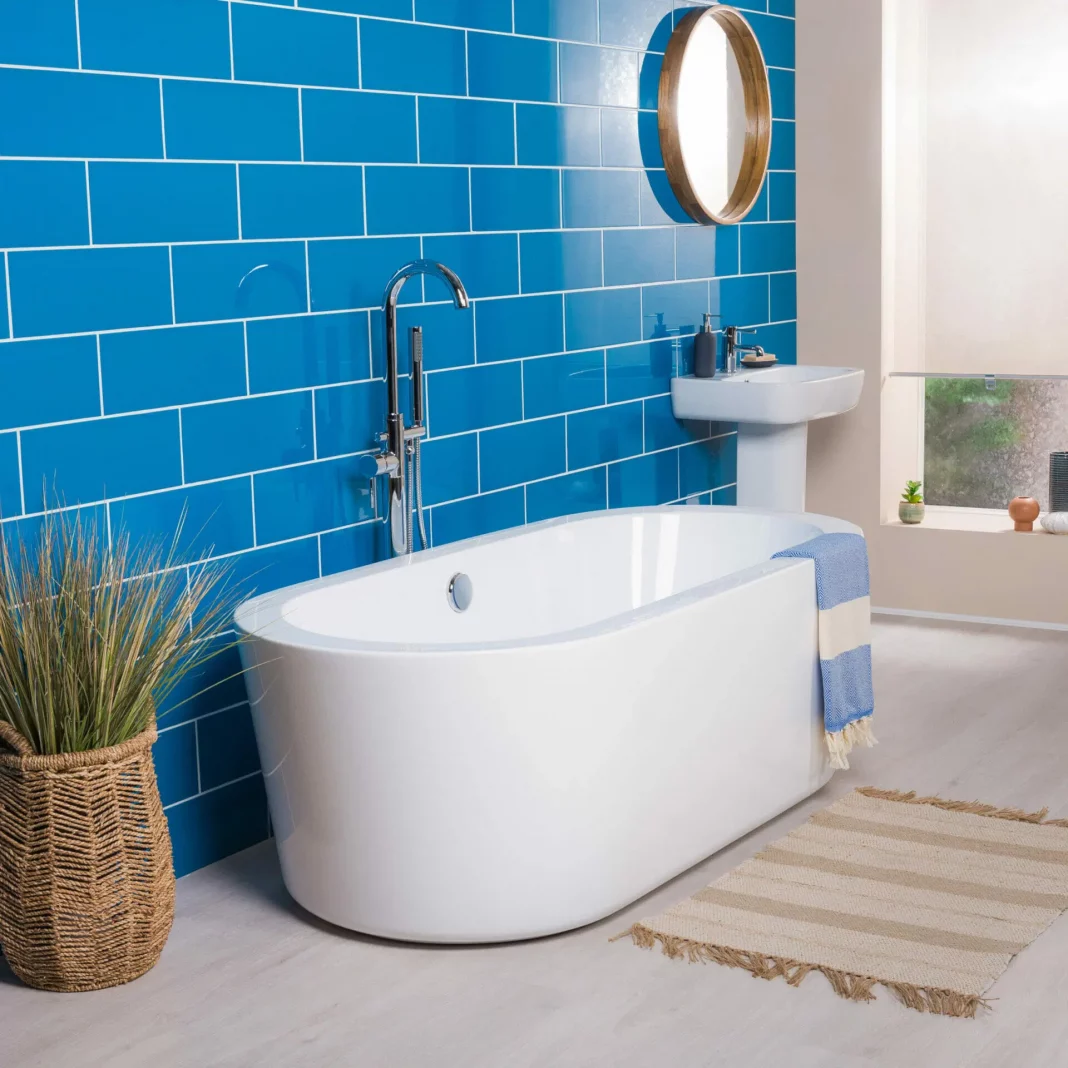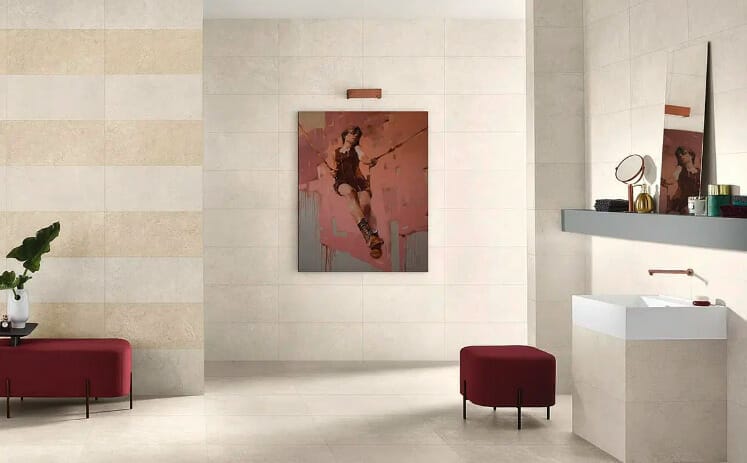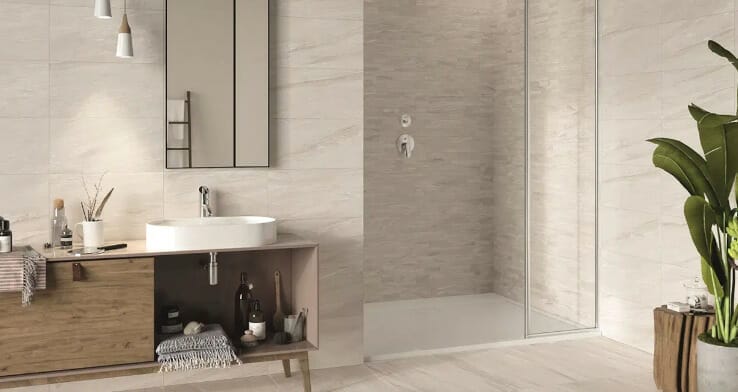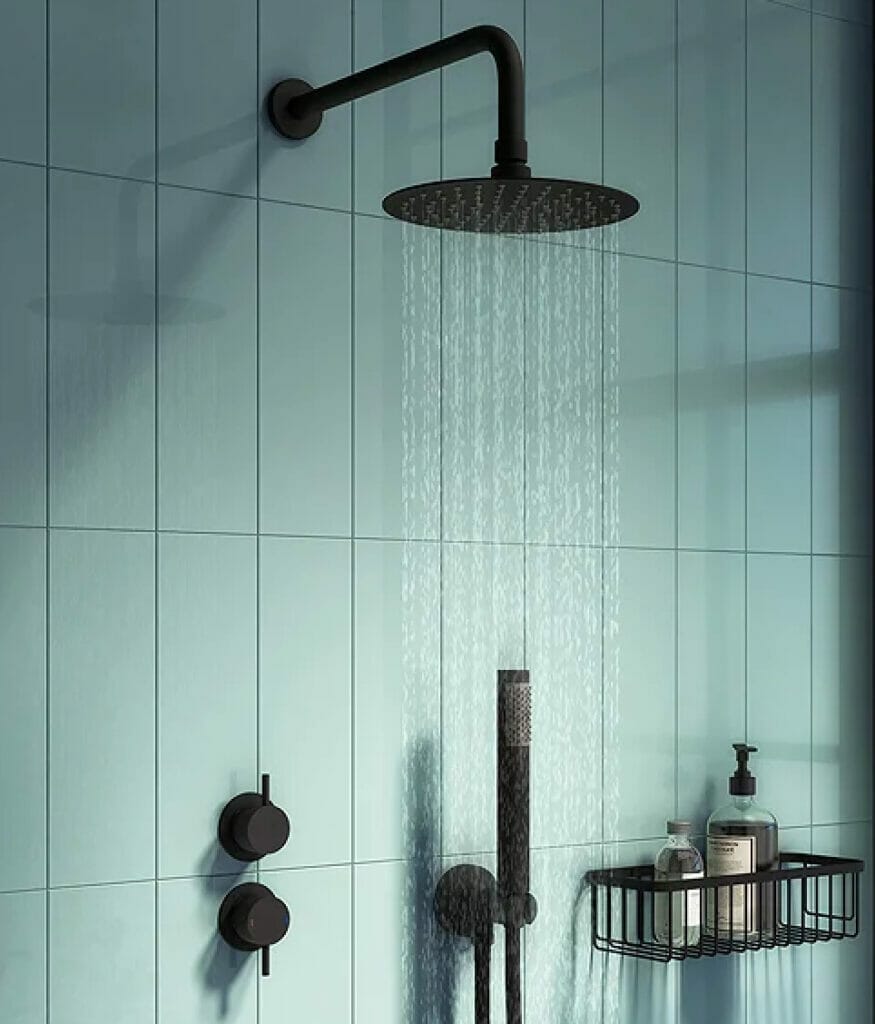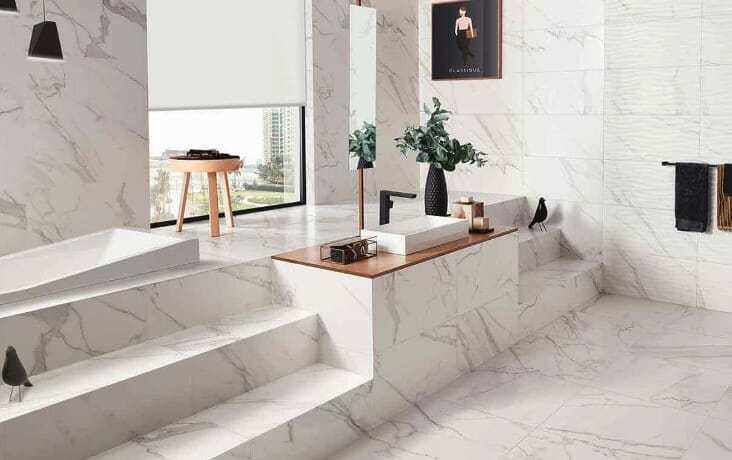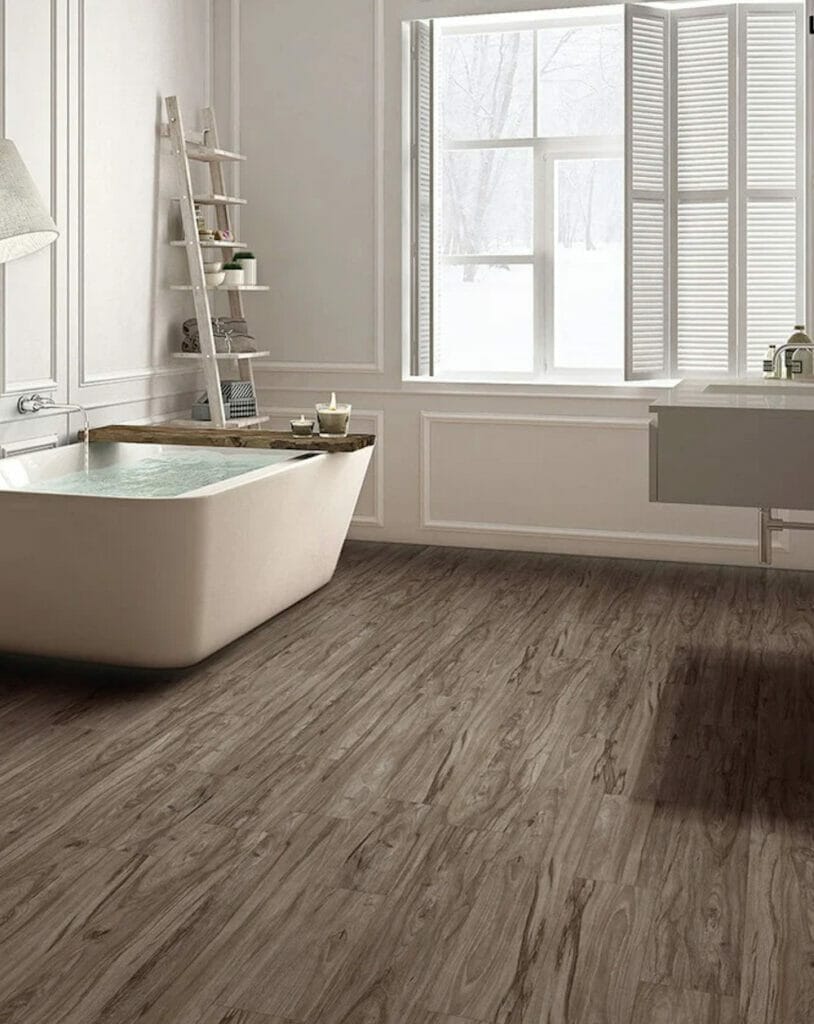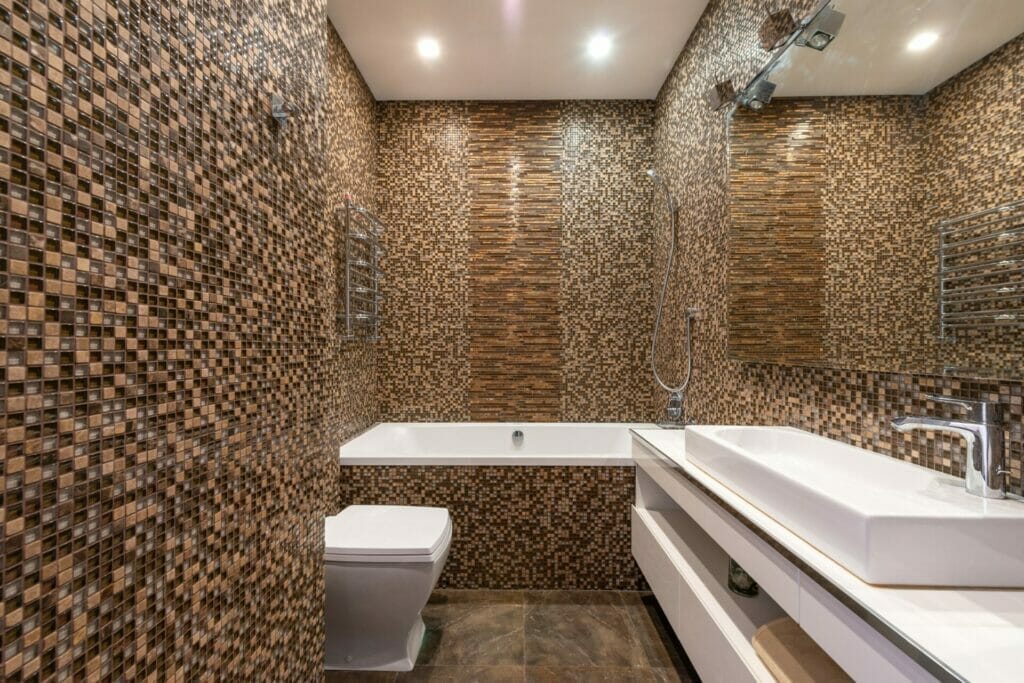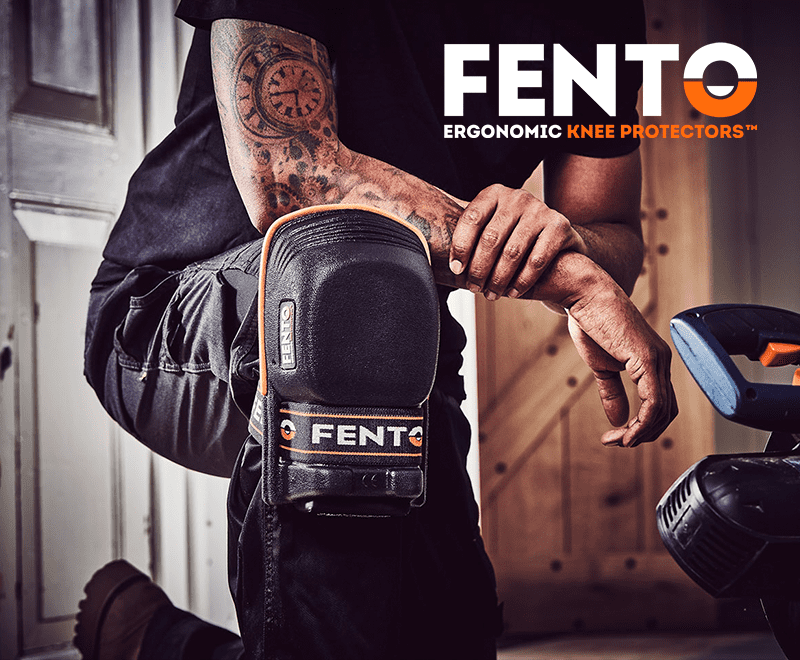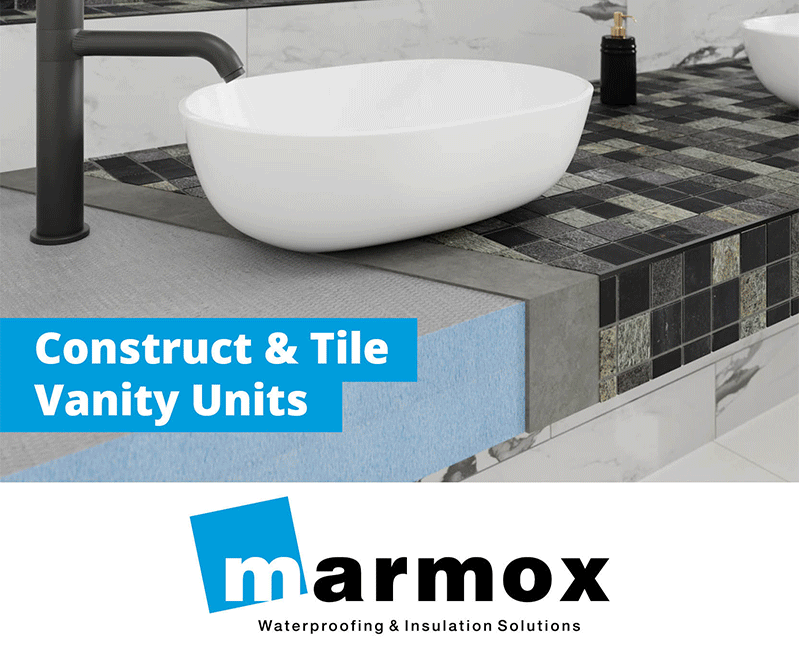Bathrooms are our private retreats, masterfully combining design and functionality to mark the start and end of our day. The type of tile you choose can profoundly influence the atmosphere, durability, and upkeep of this space. With countless tile options out there—be it the rustic allure of stone or the refined sophistication of porcelain—it is easy to feel daunted by the choices.
This comprehensive guide explores the intricacies of bathroom tiles, from wall tiles to floor tiles, contrasting popular types such as ceramic, porcelain, and glass, among others. By understanding the advantages, limitations, and unique characteristics of each tile type, you will be equipped to find the perfect match for your bathroom, ensuring it remains a calming oasis for years to come.
We will cover the following topics:
- Factors to Consider When Choosing Bathroom Tiles
- Ceramic Tiles
- Porcelain Tiles
- Glass Tiles
- Stone Tiles
- Vinyl Tiles
- Mosaic Tiles
- Why Choose EMC Tiles for Your Bathroom Makeover
#1: Factors to Consider When Choosing Bathroom Tiles
Choosing the right tile for your bathroom walls and floors isn’t just about picking the one that catches your eye. There are several factors to consider, such as:
➡️ Durability:
Bathrooms see a lot of traffic, and the tiles should be able to withstand wear and tear. Factors such as the toughness of the tiles, resistance to chipping or cracking, and long-term performance play a pivotal role in your choice.
➡️ Maintenance Requirements:
Some tiles, such as cement tiles or marble tiles, demand regular upkeep, like sealing, while others are relatively low-maintenance. Consider how much effort you are willing to put into maintaining the appearance and functionality of your tiles before you settle on a choice.
➡️ Aesthetic Appeal:
The visual aspect of the tiles can greatly influence the overall look of your bathroom. Think about the colour, texture and pattern that would best complement your decor and personal style.
➡️ Water Resistance:
Given that bathrooms are exposed to water, steam and humidity, it is essential to choose tiles that can repel water or are easily dried. This can prevent mould growth, slipping hazards and structural damage.
➡️ Cost:
Budget is a practical aspect that can’t be overlooked. While some tiles might be budget-friendly, others can be on the pricier side. It is essential to strike a balance between cost and quality, ensuring you get good value for your money.
➡️ Size and Layout:
The size of the tiles and the layout can influence the perception of space in your bathroom. Larger tiles can make a small bathroom appear bigger, while intricately patterned tiles might be more suited for feature walls or focal features.
➡️ Slip Resistance:
Safety should always be a priority, especially in wet areas. Opt for bathroom tiles that offer a certain level of slip resistance, especially for the bathroom floor.
Taking your time to consider these factors can save you from future regrets and additional expenses. Your bathroom tiles should not only resonate with your personal style but also align with your practical needs, ensuring that the space you are creating is both beautiful and practical.
#2: Ceramic Tiles
Traditional ceramic tiles have long been a favourite choice for bathrooms, combining both aesthetics and practicality in a versatile package. Rooted in ancient art and architecture, ceramic tiles are crafted from clay, sand, and water, which are then shaped, glazed, and fired in a kiln. This process gives them their characteristic hard surface and the range of beautiful finishes that we see today.
Here’s a quick guide to ceramic tiles:
➡️ A Brief History:
Ceramic tiles date back thousands of years, with early evidence of their use found in ancient Egyptian and Mesopotamian structures. They have evolved over the millennia, with techniques and designs being influenced by various cultures and eras.
➡️ Pros:
- Versatile Designs: With a vast array of colours, patterns, shapes and sizes available, ceramic tiles offer a myriad of design possibilities, ensuring a fit for any bathroom style.
- Affordable: Generally, ceramic tiles tend to be more cost-effective compared to some other tile types. This makes them a popular choice for homeowners seeking a blend of style and affordability.
- Easy to Cut and Install: For DIY enthusiasts, ceramic tiles present a relatively straightforward installation process, primarily because they are easier to cut compared to harder materials such as porcelain.
- Resistance to Stains and Scratches: The glazing on ceramic tiles offers protection against stains, and the tiles themselves are resistant to minor scratches.
➡️ Cons:
- Durability: While they are relatively durable, ceramic tiles aren’t as tough as porcelain tiles. They can be more susceptible to cracks and chips, especially if a heavy object is dropped on them.
- Porous Nature: If not properly glazed, ceramic tiles can be porous, which might make them susceptible to water absorption and possible damage over time. This is particularly a concern if the tiles are used in wet areas without proper sealing.
➡️ Recommended Uses in the Bathroom:
- Walls: Due to their vast design options and slightly lesser durability compared to porcelain, ceramic tiles are often preferred for bathroom walls where foot traffic is not a concern.
- Floors: They can be used on floors, especially in residential settings. However, ensure that they have a slip-resistant finish and are properly sealed, if necessary.
- Accent Areas: The versatility of ceramic tiles makes them an excellent choice for creating feature walls or decorative backsplashes in the bathroom.
In short, ceramic tiles, with their blend of beauty and functionality, have rightfully earned the bathroom world. Whether you are going for a contemporary look or a traditional ambience, there is a ceramic tile that is perfect for you. Explore our stunning range of ceramic tiles on the EMC Tiles website or in one of our East Midlands showrooms.
#3: Porcelain Tiles
Porcelain bathroom tiles stand out as one of the most durable and elegant choices for bathroom flooring and wall covering. Made from a type of refined clay, porcelain undergoes a firing process at extremely high temperatures, resulting in a tile that is denser, harder, and less porous than its ceramic counterpart.
Here’s a quick guide to porcelain tiles:
➡️ Definition and Difference from Ceramic:
While both ceramic and porcelain tiles originate from clay, the clay used for porcelain is more refined and pure. The firing process for porcelain tiles is more extended and at a higher temperature, which gives them their superior strength and low porosity.
➡️ Pros:
- Highly Durable: Porcelain tiles are renowned for their exceptional durability. They resist scratches, chips and cracks effectively, making them suitable for high-traffic areas.
- Water-resistant: With a very low porosity level, your porcelain tile is almost impermeable to water, making it an excellent choice for wet areas in bathrooms.
- Low Maintenance: Given their durability and water resistance, porcelain tiles are relatively low-maintenance, requiring only regular cleaning to maintain their appearance.
- Wide Design Variety: Modern manufacturing techniques allow porcelain tiles to mimic various natural materials, such as wood, stone and even fabric, providing homeowners with numerous design possibilities.
➡️ Cons:
- Cost: Generally, porcelain tiles are more expensive than ceramic ones. This is due to the higher quality of raw materials and the more energy-intensive production process.
- Installation: Porcelain’s hard nature makes it a bit more challenging to cut and install than ceramic tiles. Proper installation often requires specialised tools and expertise.
- Weight: Porcelain tiles are heavier than ceramic tiles, which can be a consideration for wall installations or when assessing the suitability for a particular structure.
➡️ Recommended Uses in the Bathroom:
- Floors: Given their high durability and slip resistance (when choosing the right finish), porcelain tiles are ideal for bathroom floors, even in high-traffic bathroom areas.
- Walls: Their water resistance and design versatility make porcelain tiles an excellent choice for bathroom walls, especially in shower areas.
- Countertops: The durability and resistance to staining make porcelain tiles suitable for bathroom countertops.
In essence, porcelain tiles offer a combination of beauty, strength and longevity. While they come with a slightly higher price tag than some other options, their lasting durability and timeless appeal often make the investment worthwhile, especially in spaces such as the bathroom where moisture resistance and durability are paramount. Take a look at our wide selection of porcelain tiles at EMC Tiles.
#4: Glass Tiles
Glass tiles, with their luminous and reflective qualities, bring a touch of modern elegance and vibrancy to bathrooms. Originating from ancient times, these tiles have evolved significantly in design and application, making them a favourite for homeowners looking for a unique, sophisticated touch.
Here’s a quick guide to glass tiles:
➡️ Brief History:
Glass tiles, as the name suggests, are made primarily from glass. They date back to ancient times, with civilisations such as the Byzantine Empire using them to create stunning mosaics. Modern glass tiles offer even more variety and versatility, thanks to technological advancements in manufacturing.
➡️ Pros:
- Reflective Quality: One of the most striking attributes of a glass tile is its ability to reflect light. This can brighten up a space, making bathrooms appear larger and more luminous.
- Colour Variety: Glass tiles come in a vast array of colours, with the potential for vibrant, clear, and consistent hues that other tile materials can’t match.
- Non-porous: Glass tiles are naturally non-porous, meaning they won’t absorb water or stains. This makes them resistant to mould or mildew and easy to clean.
- Eco-friendly: Many glass tiles are made from recycled glass, making them an environmentally-friendly choice for the eco-conscious homeowner.
➡️ Cons:
- Slippery When Wet: Especially when used for flooring, glass tiles can be quite slippery when wet. Therefore, it is crucial to choose tiles with a textured or slip-resistant surface for bathroom floors.
- Cost: Glass tiles tend to be pricier than ceramic or porcelain tiles, mainly due to their manufacturing process and the quality of materials used.
- Fragility: While they are sturdy once installed, glass tiles can be more fragile during the installation process. They can be susceptible to cracking or chipping if not handled or installed correctly.
- Maintenance: While they are easy to clean, glass tiles can show fingerprints or water spots more readily than other tile types. This might require frequent cleaning to keep them looking their best.
➡️ Recommended Uses in the Bathroom:
- Accent Walls: Due to their reflective quality and variety of colours, glass tiles are often used to create accent walls or design features in bathrooms.
- Backsplashes: Their resistance to stains and ease of cleaning make glass tiles an excellent choice for bathroom backsplashes.
- Shower Areas: Their water-resistant nature makes them suitable for shower walls, but if used on floors, ensure they have a slip-resistant finish.
- Mosaic Designs: Given their origin and aesthetic appeal, glass tiles are perfect for creating intricate mosaic designs, adding a touch of luxury and artistry to bathrooms.
In conclusion, glass tiles, with their shimmering beauty and array of design possibilities, can elevate the aesthetics of any bathroom. While they come with certain considerations, particularly regarding installation and cost, their unique appeal and functionality make them a consideration worth exploring.
#5: Stone Tiles (e.g., granite, marble, slate and travertine tiles)
Evoking the natural beauty and timeless appeal of the earth’s bounty, stone tiles offer unparalleled elegance and luxury. Whether it’s the opulence of marble, the rugged charm of slate, the enduring strength of granite or the natural earthy look of travertine, stone tiles have a unique character that can transform a bathroom into a stunning oasis.
Here’s a quick guide to stone tiles:
➡️ Definition and Types:
Stone tiles are derived from large blocks of natural stones that are extracted from quarries and then cut into thin tiles. The four most common types used in bathrooms are:
- Granite: Known for its durability and grainy appearance, granite tiles exhibit a speckled design due to the mix of quartz, mica, and feldspar.
- Marble: Renowned for its veined patterns and soft, luxurious look, marble has been a symbol of opulence for centuries.
- Slate: A fine-grained rock, slate tiles showcase layered colour variations and can offer a more rustic and textured appearance.
- Travertine: A type of limestone that forms around mineral spring deposits. It is recognised for its earth-tone colours, like tans, browns, rust and beige hues.
➡️ Pros:
- Natural Beauty: The biggest draw of stone tiles is their natural and distinct patterns. They convey a natural, robust and luxurious feel to any bathroom space. No two tiles are the same, ensuring a completely unique look.
- Durability: Stone, being a natural material, is incredibly durable. Granite, for instance, is resistant to scratches and can last for decades.
- Adds Value: Incorporating natural stone tiles can enhance the overall value of a property, given their luxurious appeal.
- Variety: Available in various finishes, from polished to honed or tumbled, stone tiles provide versatile design options.
➡️ Cons:
- Porous Nature: Stones like marble are naturally porous, making them susceptible to stains if not sealed properly.
- Maintenance: Regular sealing is often required to prevent moisture absorption, especially in wet areas. Some stones might also be susceptible to etching from acidic substances.
- Cost: Natural stone tiles tend to be on the pricier side compared to ceramic or porcelain tiles due to the quarrying and processing involved.
- Weight: Stone tiles are considerably heavy, which might require additional floor support and can make installation more challenging.
➡️ Recommended Uses in the Bathroom:
- Floors: Granite and slate, given their durability and slip-resistant properties when appropriately finished, are suitable for bathroom floors.
- Walls: Marble, with its elegant veins, is often a favourite for wall installations, adding a touch of luxury to bathroom interiors.
- Countertops: Granite, known for its durability and resistance to scratches, is a popular choice for bathroom countertops.
- Shower Areas: When sealed properly, stone tiles can be used in shower areas. However, it is essential to ensure regular maintenance to prevent water absorption.
In essence, natural stone tiles bring a sense of the great outdoors into your bathroom, offering a timeless, organic look and feel. Their charm lies in their unique patterns and enduring strength. With proper care and maintenance, stone-tiled bathrooms can remain a haven of luxury for many years. Explore our fantastic selection of stone tiles for all spaces.
#6: Vinyl Tiles
A more recent addition to the world of bathroom tiles, vinyl tiles have rapidly gained popularity due to their cost-effectiveness, comfort and versatility. Made from a combination of vinyl resin and various additives, these tiles offer a synthetic alternative with a myriad of benefits.
Here’s a quick guide to vinyl tiles:
➡️ Definition and Composition:
Vinyl tiles are composed of coloured polyvinyl chloride (PVC) chips formed into solid sheets of varying thickness through heat and pressure. The tiles can have multiple layers, including a protective layer, a design layer, and a core structure.
➡️ Pros:
- Affordability: One of vinyl’s most appealing aspects is its cost-effectiveness. It provides a budget-friendly option for those who want the look of more expensive materials without the hefty price tag.
- Easy Installation: Vinyl tiles often come with self-adhesive backings or are designed for floating installations, making the process relatively straightforward even for DIY enthusiasts.
- Comfort: Unlike hard tiles, vinyl tiles have a softer and warmer feel underfoot, which can enhance comfort, especially in colder climates.
- Water Resistance: Being synthetic, vinyl tiles are inherently resistant to water, making them a solid choice for bathrooms where moisture is prevalent.
- Versatile Designs: Modern manufacturing techniques allow vinyl tiles to mimic the appearance of various natural materials, such as wood, stone and even ceramic, offering a broad spectrum of design possibilities.
➡️ Cons:
- Durability Concerns: While vinyl tiles are reasonably durable, they aren’t as long-lasting as materials like porcelain or stone. They can be susceptible to dents, scratches or tears, especially in high-traffic areas.
- Environmental Impact: Being a synthetic material, the production of vinyl tiles might not be as environmentally friendly as natural materials. Some vinyl tiles can also emit volatile organic compounds (VOCs), although many manufacturers now offer low-VOC options.
- Resale Value: Despite their appearance, vinyl tiles might not contribute as significantly to a home’s resale value compared to premium materials like natural stone.
➡️ Recommended Uses in the Bathroom:
- Floors: Given their water resistance and comfort, vinyl tiles are well-suited for bathroom floors, providing both practical and aesthetic appeal.
- Walls: While less common, vinyl tiles can be used on bathroom walls, especially if a cohesive look with the floor is desired.
- Underfoot Heating Systems: Vinyl tiles can often be used with radiant underfloor heating systems, enhancing warmth and comfort in the bathroom.
In short, vinyl tiles offer an exciting blend of comfort, design versatility and affordability. They provide homeowners with a practical solution that caters to both functionality and aesthetics. However, understanding their limitations ensures that they are used in contexts where their benefits can be maximized.
#7: Mosaic Tiles
Mosaic tiles, often small and arranged in a variety of intricate patterns, have been a cornerstone of artful design for thousands of years. They allow designers and homeowners to unleash their creativity, producing stunning visuals that can range from the elegantly simple to the brilliantly complex.
Here’s a quick guide to mosaic tiles:
➡️ Definition and History:
Mosaic tiles are typically small, square pieces of ceramic, glass, stone, or other materials, which are arranged in patterns or designs to create a cohesive image or motif. Historically, mosaics adorned palaces, temples, and famous buildings, showcasing the artistry and craftsmanship of various civilisations.
➡️ Pros:
- Artistic Appeal: The primary allure of mosaic tiles is the artistic freedom they offer. With countless colour combinations and design possibilities, they can turn any bathroom into a unique masterpiece.
- Versatility: Mosaics can be made from a wide variety of materials, including glass, ceramic, porcelain, stone and even metal. This offers a broad palette of textures and colours to work with.
- Adaptability: Due to their small size, mosaic tiles can easily adapt to uneven surfaces and are perfect for areas with curves or non-traditional shapes.
- Hygiene: The grout lines in mosaic tiling mean there’s less surface area for slips in wet conditions, making them a safe choice for wet bathroom areas.
➡️ Cons:
- Maintenance: The intricate patterns and numerous grout lines can make cleaning these small tiles a bit more tedious. Grout can be prone to discolouration and might require regular sealing to prevent moisture and stains.
- Cost: Depending on the material and complexity of the design, mosaic tiles can be more expensive than standard tiles, given the craftsmanship involved.
- Installation: Laying mosaic tiles can be time-consuming, especially for complex patterns. It is often best to rely on professionals for a flawless finish.
➡️ Recommended Uses in the Bathroom:
- Feature Walls: Mosaic tiles are perfect for creating feature or accent walls in a bathroom, immediately drawing the eye and adding a touch of elegance.
- Built-in Shower Shelves: Enhance the functionality and aesthetics of built-in shower recesses by lining them with mosaic tiles, setting them apart from the rest of the shower area.
- Backsplashes: Given their artistic appeal, mosaics are an excellent choice for bathroom backsplashes, adding vibrancy and character.
- Borders and Trims: Mosaic tiles can be used to create borders or trims, breaking the monotony of large tiles and adding a touch of intricacy to the design.
In summary, mosaic tiles, with their endless design possibilities, allow homeowners to create bathrooms that are both personal and artistic. While they come with certain considerations regarding installation and maintenance, the visual reward often makes these nuances worth the effort.
#8: Why Choose EMC Tiles for Your Bathroom Makeover
Bathroom renovations can be both exciting and daunting. EMC Tiles has been the customers’ trusted partner in the East Midlands in creating perfect bathrooms for over four decades.
Here’s why you should choose us:
- Four Decades of Expertise: We at EMC Tiles boast a staggering 40 years in the tile business, which is a testament to our enduring commitment to quality, excellence and customer satisfaction. Such longevity ensures a depth of knowledge and expertise, making us masters in understanding trends, quality and client needs.
- A Trusted Name in the East Midlands: Our reputation as a leading tiles supplier in the region is built on decades of consistently delivering on promises, maintaining the highest quality and offering a diverse range of tiles that cater to diverse tastes and preferences.
- Award-Winning Quality: We, at EMC Tiles aren’t just recognised by our valued customers; the industry applauds our excellence too. As an award-winning tile supplier, we have been acknowledged for our commitment to quality and unparalleled service.
- Wide Range of Options: Whether you are looking for contemporary designs, classic elegance or eclectic patterns, we offer an extensive range of tiles that cater to diverse tastes. Our carefully selected tile collections ensure that every homeowner finds the perfect tiles for their home.
- Customer-Centric Approach: We understand the unique needs of every customer. Our experts are ready to guide you and ensure that your home has that wow factor.
- Sustainability and Responsibility: We are committed to sourcing and supplying tiles in a manner that is sustainable and eco-friendly, ensuring that our customers can make responsible choices without compromising on style.
Your Dream Bathroom is Just a Click Away!
Whether you are renovating your existing bathroom or designing a new one, let us help you make the perfect choice. Explore our extensive range of high-quality, stylish bathroom tile options on our website, or visit one of our showrooms.
Our team of experts would be delighted to show you around and advise you.


